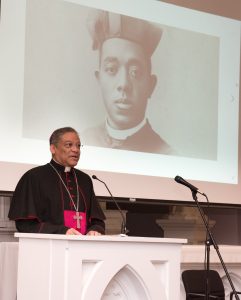As probably the most nation's five active black Catholic bishops, people question me all the time what they could do to confront the racial complications of our day.
I take their questions as a signal of their truthful need to live with the tone centered for us through the Savior Jesus Christ, a trustworthy need to let his Gospel redeem us from the sins of fear, indifference, and racial and ethnic prejudice.
The region to start, I consider, is in our own hearts and in our personal little corners of the world. And the primary concrete step we should take is to courageously examine our consciences.
suppose about our suggestions and words, our moves or inactions. will we discover expressions or refined references to the inferiority of certain peoples?
Have we picked up aware or unconscious bias concerning peoples of colour or other marginalized peoples from our homes and formative environments? How might this have influenced my worldview or decided my assumptions about definite sorts of individuals?
continuing this examination, we wish to assess no matter if we avoid the experiences, the neighborhoods, or the viewpoints of americans of color. Do I see individuals of color as a possibility, or do I consider them under me or by hook or by crook making my existence problematic? at the extremes: Do I get anxious or go the street after I see a person of color strolling towards me?

Chicago Auxiliary Bishop Joseph N. Perry, postulator for the sainthood explanation for Father Augustus Tolton, speaks at the Dominicans' motherhouse in Nashville, Tenn., Feb. 10, 2019. (CNS image/courtesy the Dominican Sisters of Nashville)
we are believers in Jesus Christ. Our gestures and phrases should at all times point out that we agree with the Christian message: that every man, lady, and newborn has inherent dignity.
in the Gospels, we find a particular pattern within the life of Jesus. He broke during the normal biases and prejudices that plagued the society of his day.
A Jew himself, Jesus became deliberate about his friendships and about together with those that have been excluded and on the margins of society and the religious neighborhood: the sick, those whose lives have been morally compromised, the impoverished, Samaritans, Romans, officers, girls.
along with his parable of the decent samaritan, through which he teaches us to peer each person as our neighbor, and along with his command to love even our enemies, he units the tone for a way we're to reside as his disciples.
of course, over the millennia, Jesus' disciples haven't at all times lived as much as the teachings and example of their grasp.
Jesus called every person to conversion of life. And he continues to call us to destroy throughout the hesitation and worry endemic to the human circumstance when we're confronted with people that are distinct from us, even if those adjustments be racial, financial, or changes in wealth.
From the instance of Jesus, we are able to birth to believe about how we might make concrete changes in our homes and parishes to think and act greater inclusively, with the identical love and sensitivity that Jesus verified.
In our homes and parishes, we deserve to make spaces for our young americans to be in a position to pray and contemplate racism and the social unrest we now have been seeing.
And as fogeys and Church leaders, we should in reality hearken to their experiences. What do they see going on of their colleges with fellow students of distinctive backgrounds, races, or ethnicities?
We need to motivate our younger americans to be artistic, to be ambassadors of friendship and goodwill. younger individuals have keen observations about what is fair, correct, and wrong. We should invite them to come up with action steps which are significant to them.
In Catholic dioceses around the nation, bishops were strategic in attempting to raise range in ministries, faculties, liturgies, and diocesan administrations. This has taken lots of energy, forethought, and schooling. It has also taken the humility to confess incorrect and proper missteps.
i know this work most efficient in my very own Archdiocese of Chicago. in the Nineties, we launched racial sensitivity workshops and different classes for pastors and administrators in our parishes and colleges.
more lately, Cardinal Blase Cupich has ordered the advent of a curriculum on race to be protected in our basic and secondary faculties.
These styles of initiatives could make a difference for the next technology of Catholics, who will expectantly see issues greater obviously and do things superior than we're doing now.
everywhere in the Church, we need to proceed to study and discover how racism appears and how it is skilled via people of color. We need to continue to inspire pastors to evangelise towards racism and to take personal responsibility to eradicate refined traces of racism in parish existence.
the USA Catholic bishops have produced many substances to aid us. considering the fact that 1958, the bishops have produced practically a dozen major statements on the country wide level, most currently "Open extensive Our Hearts: The Enduring name to love — A Pastoral Letter towards Racism" in 2018. local bishops around the country have issued their personal statements and pastoral letters.
i like to recommend reading these substances and speakme about them for your Bible stories or in small neighborhood settings. expand your cognizance of how structural realities in our society have an effect on minorities' access to respectable schools, best health care, fair paying jobs, and good housing.
I also encourage americans to "agenda" diversity into their lives. We deserve to be intentional about in the hunt for tips on how to range in our relationships, with co-people, neighbors, our circles of friends and pals.
again, it is respectable to ask: who are the individuals you hold around with? who are your little ones's friends? Are they ordinarily or totally of 1 ethnicity?

Donna Hargens, superintendent of Catholic faculties for the Archdiocese of B altimore, congratulates Ss. James and John Catholic college scholar Breanna Ervin, left, and Holy Angels Catholic college scholar, Jaylah Golder, following their remarks on the Oct. 23, 2019 groundbreaking of the mom Mary Lange Catholic college in Baltimore. (CNS photograph/Kevin J. Parks, Catholic evaluation)
One purposeful element we can do is try to worship once in a while in a Catholic Church where the congregation is predominantly from a distinct ethnic community. This helps us imbibe a sense of the worth, the choices of a americans, the way of life and beauty of a individuals.
We need to proceed to work to construct bridges and smash down limitations and try to hyperlink our parishes and ministries across racial and ethnic traces.
an additional idea might be to volunteer at a parish meals pantry or meal application; primarily bring your toddlers along. Performing the corporal works of mercy deepens your consciousness of the wants of others, and how often race plays an element in individuals's poverty.
Single-race or predominantly ethnic parishes don't seem to be the most suitable. often, alas, our parishes reflect the racial segregation patterns of yank neighborhoods. We need to keep engaged on overcoming these racial divides. In our ministries we should seem for ways to companion and hyperlink our parishes across racial, ethnic, and cultural traces. Diocesan-huge movements can even be opportunities to bring individuals together to celebrate our range as a Church.
the primary Pentecost suggests us the beautiful "weave" of the human race, with individuals from each nation, race, and language all gathered to listen to the Gospel. Pentecost suggests us that the Church is supposed to be a widely wide-spread group of americans. It indicates us that nationality, race, ethnicity, language — these uniquely picking out human marks — represent the imprint of a remarkably artistic and loving Creator upon us.
We nonetheless have an extended method to move in making that Pentecost template a fact in our Church and in our neighborhoods and society.
however Jesus insists that we implement his teachings and that we be lights on this planet and the salt of the earth. In different words, Jesus calls us to be the seasoning of lifestyles's adventure toward the more desirable. And with him, and working collectively, we recognize that we will create extra gentle for our darkness, more braveness for our fears, more hope for our disappointments, greater knowledge for our confusion, extra love for our hate, and greater peace for our turmoil.
a whole lot has been accomplished. And an awful lot more has to be achieved for the honor of God.



No comments:
Post a Comment